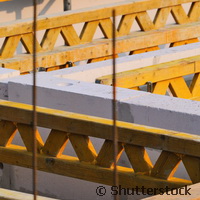Building eco-friendly straw homes - panel by panel
The EU-funded project EUROCELL ('EU market development of ModCell: a prefabricated eco-building system utilising renewable materials') is paving the way to using straw bale as a building material, employing a method pioneered at the University of Bath in the UK. The project aims at further developing the environmentally friendly method and at gaining market certification as a step towards its widespread introduction. The system, patented as ModCell, employs the superior thermal insulation qualities of straw bales to create prefabricated panels. ModCell panels consist of a timber structural frame filled with straw bales and rendered with a breathable lime-based material. "In addition to novel panels insulated with straw, we're also developing improved manufacturing processes and franchising," says lead researcher Professor Pete Walker from the University of Bath. Through the EU's eco-innovation funding scheme, the project brought together a powerful team of architectural, engineering and design firms, in association with the University of Bath. "We have less than a year towards project completion, and we're working to ensure industry recognition and acceptance through certification for ModCell," says Walker. The system could claim three to five percent of the European market share by 2020, he says. ModCell exploits the advantages of straw, which is a renewable resource and can be grown close to a construction site. Since it absorbs carbon dioxide as it grows, it has a zero, or even negative carbon footprint. BaleHaus is a two-storey prefabricated building constructed of straw bale and hemp cladding on the University of Bath's campus, and was developed to explore the properties of this low-carbon material. "The product will significantly reduce carbon emissions from new buildings through savings during manufacture and operation of the building," says Walker, explaining that buildings generally contribute to around 50 percent of EU emissions. The team aims to reduce the carbon impact of new buildings by up to 80 percent compared to current building solutions. In addition to carbon savings, the use of an agricultural co-product such as straw reduces reliance on non-renewable resources. The project, due to end in August 2014, has successfully produced a new, improved version of the ModCell panel, which is now being exploited through the project partners. "We have plans to expand our production model outside the UK through franchising, starting with the Netherlands," says Walker. While the project has been very successful on the technical front, the team is now working on overcoming challenges in meeting certification requirements so the process can be used widely across the construction industry. "Despite some delays we're now making good progress related to industry recognition, acceptance, and certification," says Walker. Beyond the environment, Walker is able to list advantages for society and the economy, including affordable energy-efficient housing and buildings, healthier structures to live in, and job creation. The EU contributed half of EUROCELL's budget of around EUR 1.6 million.For more information, please visit:EUROCELLhttp://www.euro-cell.orgProject factsheethttp://www.eaci-projects.eu/eco/page/Page.jsp?op=project_detail&prid=2041ModCellhttp://www.modcell.com
Countries
United Kingdom



